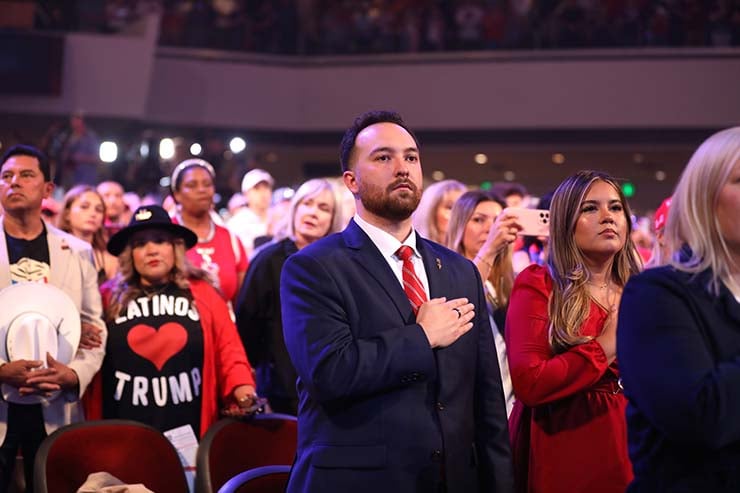The 2024 presidential election has revealed a seismic and surprising shift in the Hispanic voting bloc, challenging long-held assumptions and illuminating the complexity of Hispanic political leanings.
Exit polls from both Fox News and NBC News tell a fascinating story of transformation, with Donald Trump capturing significant Hispanic support—a demographic traditionally thought to lean Democratic. This analysis dives into the key role religion played in this shift, as Trump decisively won over Hispanic Protestants while facing an opposite trend among Hispanic Catholics.
According to Fox News exit polls, Trump won an impressive 60 percent of the Hispanic Protestant vote in 2024, a remarkable gain from the previous election where support was split. This surge is no accident; it’s rooted in Trump’s strategic alignment with the values most important to Hispanic Protestants, a group notable for its high levels of religious devotion. A Pew Research survey reports that nearly 80 percent of Hispanic Protestants attend church at least monthly, with strong evangelical leanings, which means they’re passionate about religious freedom, opposition to abortion, and traditional family structures.
Trump’s rhetoric around defending these values hit home. His campaign framed him as a guardian of their beliefs, ensuring religious rights and prioritizing the family unit, a message that found fertile ground in devout Hispanic Protestant communities. This group saw Trump as a leader who not only understood their principles but as one who would fight to protect them in a changing America. This powerful message was a key factor in drawing an unprecedented portion of the Hispanic Protestant vote toward the Republican side.
Meanwhile, a contrasting picture emerges with Hispanic Catholics. In this group, Trump faced a significant loss.
According to NBC, Kamala Harris secured 62 percent of Hispanic Catholic votes. The reasons are complex and raise interesting questions about the nominal religiosity of Hispanic Catholics, many of whom, like white ethnic Catholics, often practice their faith less actively. Studies indicate that only about 35 percent of Hispanic Catholics attend Mass regularly, and many identify with Catholicism culturally rather than through active participation in the faith.
This difference in religiosity has political implications; while Hispanic Protestants rallied behind a candidate supporting clear moral and cultural values, Hispanic Catholics leaned Democratic, partly because of their historical loyalty to the party’s focus on immigration, poverty, and labor—issues where they feel Democrats better align with their community’s needs.
Many Hispanic Catholic voters, more nominal than devout, connect with the Democratic Party’s stance on social justice, viewing it as a champion for immigrants and low-income families, two substantial segments of the Hispanic Catholic population.
In this context, the Democratic message resonated, painting a picture of Harris as someone more aligned with Catholic teachings of compassion and social welfare, especially for vulnerable populations. Yet this alignment is often more cultural than religious, as many Hispanic Catholics support these issues without deep engagement in their faith—a stark contrast to the fervor seen among Hispanic Protestants.
Beyond the religious divide, economic concerns were a decisive factor in reshaping Hispanic voting patterns. NBC exit polls show that the economy was the top issue for Hispanic voters, many of whom feel their financial situation has worsened since 2020. Rising inflation and living costs weighed heavily on Hispanic families, and Trump’s focus on economic revival struck a chord.
Among Hispanic men, his support increased by 10 points from 2020, reversing the 23-point lead Biden previously held. Many of these men saw in Trump’s promises a route back to stability through lower inflation, job creation, and economic opportunity. Trump’s message spoke to Hispanic men about their roles as primary earners, underscoring that financial priorities could often outweigh other political loyalties.
This shift in Hispanic voting patterns offers insights and signals new strategies for both parties moving forward. For Republicans, the rise in Hispanic support—particularly among Protestants—suggests that engaging Hispanic voters on cultural and religious grounds is a winning approach. By positioning themselves as defenders of traditional values, Republicans have the potential to establish lasting ties with these communities, especially if they can expand this messaging to include other Hispanic subgroups without losing the moral messaging that resonated so strongly this election.
For Democrats, the loss of Hispanic voters, particularly men, is a call to address economic frustrations more head-on. The Hispanic Catholic vote, which remains with the party largely through cultural rather than active religious ties, may not be a solid foundation for long-term loyalty.
The Democratic Party may need to reconsider its approach, especially when it comes to religious and economic diversity within the Hispanic community. Outreach that includes respect for cultural values and economic security may be crucial to rebuilding trust among Hispanic voters who feel their economic well-being has been overlooked.
The 2024 election has not only redefined the political landscape but has highlighted the complexity and nuance within the Hispanic electorate.
Religion and economics are central determinants of Hispanic political preferences, revealing that the Hispanic vote is not monolithic but rather a blend of beliefs, backgrounds, and economic priorities. For future elections, political parties will need to adopt a nuanced understanding of these diverse identities, building policies and messages that resonate with the full spectrum of Hispanic voters.
This election underscores the vital importance of recognizing the rich, layered identities of the Hispanic electorate for any party seeking meaningful and lasting engagement.

Leave a Reply